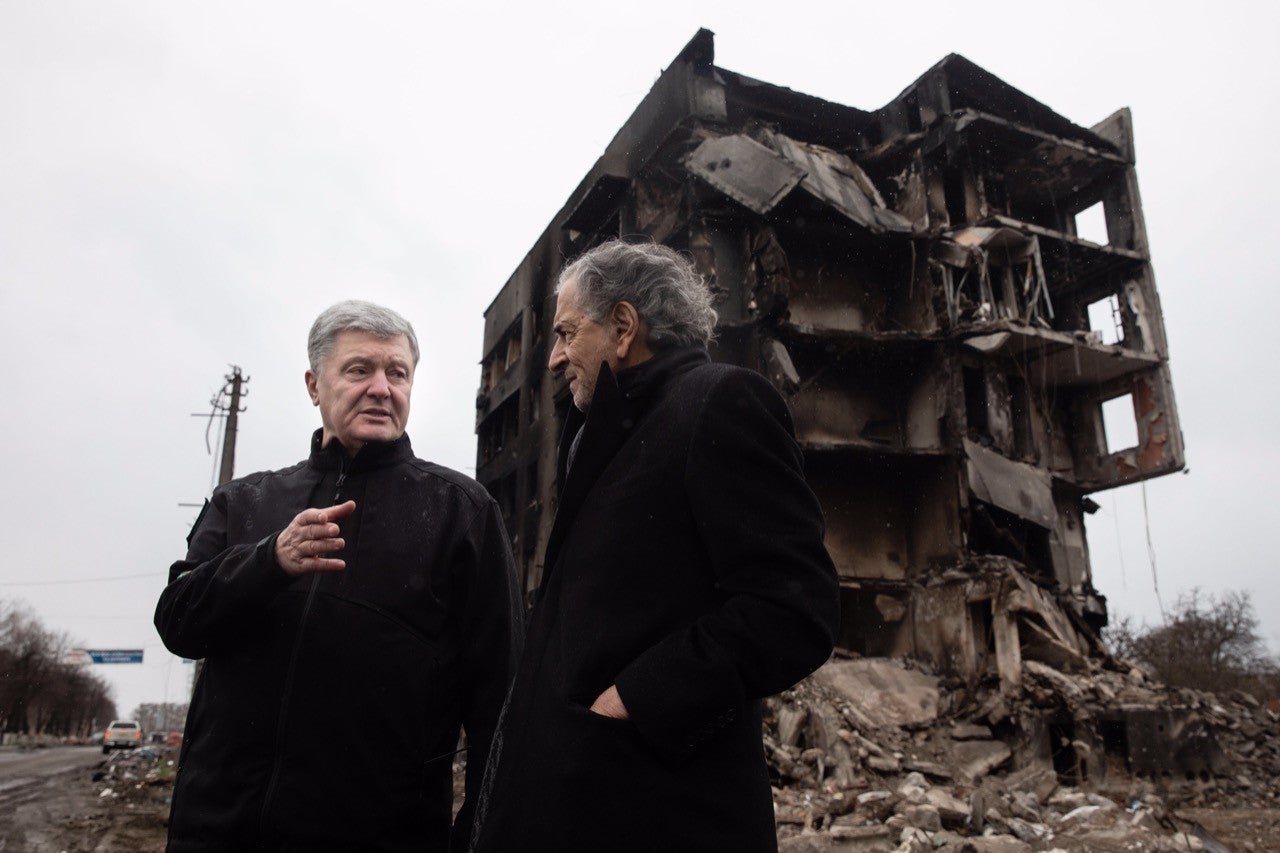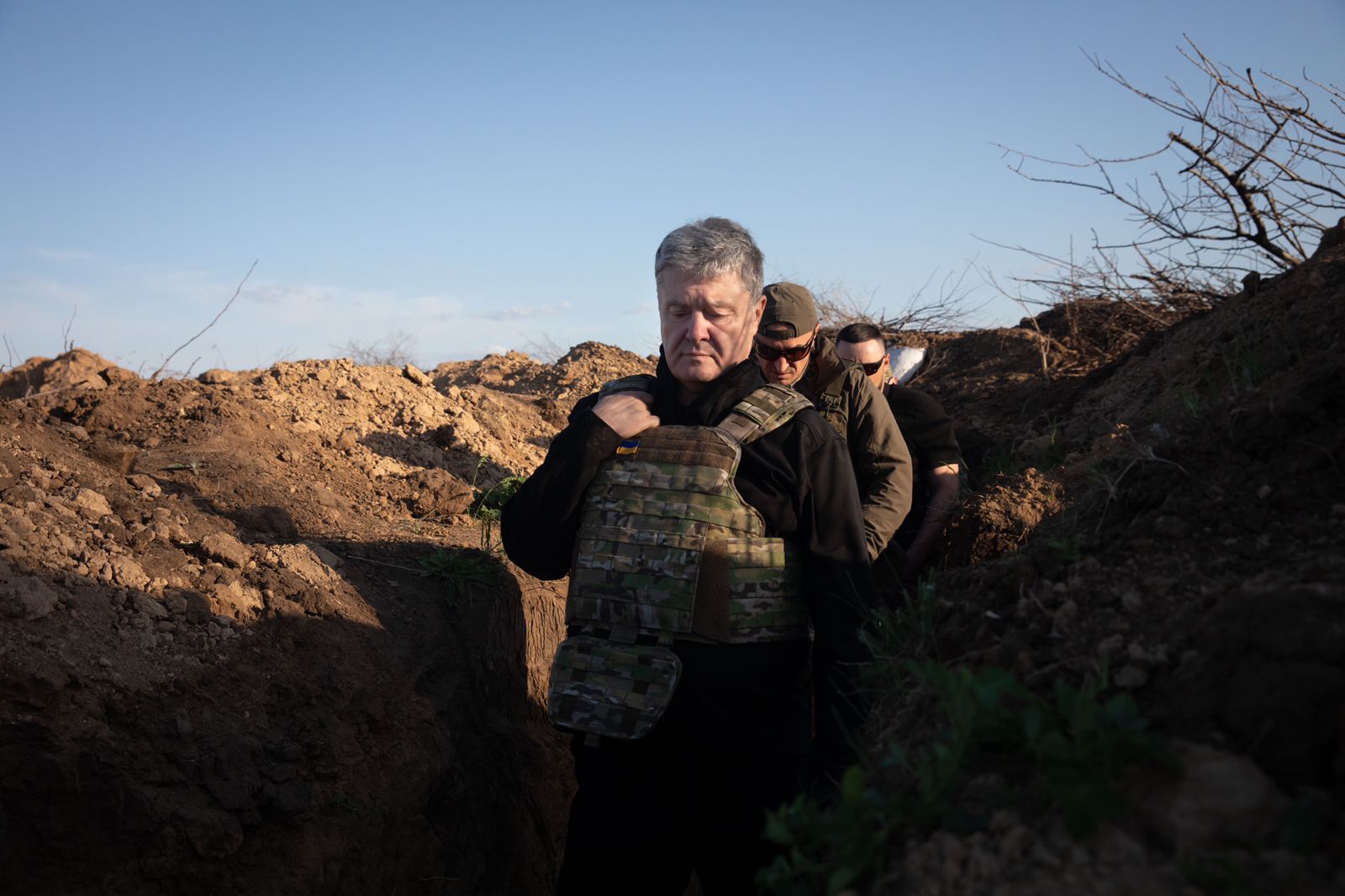Former Ukrainian president says country can ‘never forgive’ Russia for war
Exclusive: Petro Poroshenko tellsThe Independent Ukraine needs continued help from the west and says Vladimir Putin should be sentenced for being a war criminal

Back in 2014, after winning the Ukrainian presidential election, Petro Poroshenko didn’t see any reason for Russian president Vladimir Putin to launch a war against Ukraine.
Mr Poroshenko led the country through the first phase of the war in the Donbas. Eight years on, he sees no reason at all for Russia’s full-scale war in Ukraine.
“I think Putin’s behaviour is completely crazy,” the man who served as the fifth president of Ukraine (from 2014 to 2019) tells The Independent from central Kyiv.
Mr Putin’s actions are a violation of international law and principles, he adds. “He wants to completely erase Ukraine from the world map. We just want to protect and live in our own state with its 1,000-year-old history.”
Compromise or reaching an agreement with Mr Putin is impossible, says Mr Poroshenko, who wants to see the Russian leader convicted in The Hague “as a military criminal”.

The war has now reached its fourth month. Losses are piling up on both sides, and it is clear that Russia’s aims to quickly seize the Ukrainian capital Kyiv have not been realised. For now, at least, it appears that Moscow is intent on continuing its attacks in the east and southeast of Ukraine.
The potentially drawn-out nature of the Ukraine conflict has led to it being compared to other wars, but Mr Poroshenko dismisses such comparisons.
“This is not a Syrian war. This is not an Afghan war,” he says. “In 70 days of the war, Russia lost nearly 25,000 soldiers,” he claims, quoting figures from the Ukrainian armed forces. “The Russian losses for 70 days are twice [those sustained during] 10 years in Afghanistan.”
He continues: “Despite all the war crimes the Russian soldiers [commit] against Ukraine, we are a civilised country. We stick to the international conventions, including the Geneva Convention. If you see what Russia does with Ukrainian prisoners, it is a disaster, and this is exactly why the ‘Bucha list’ matters.”
Bucha – a town about 30km (19 miles) northwest of Kyiv – has been called a crime scene, and its name has become a byword for potential war crimes committed by Russia during the conflict.
Russian forces prevent people from mourning the dead, Mr Poroshenko says; they have destroyed and buried all the evidence of dead Ukrainian civilians and Russian soldiers, and transformed them into dust to cover up their wrongdoings.
Journalists and humanitarian organisations visited last month, after the Russian troops left in late March, and found scores of dead, mass graves, bodies in bags, and evidence of torture, rape and waterboarding. Last month, UN secretary-general Antonio Guterres called for an immediate, independent investigation in Bucha to guarantee Russian accountability. Russia has denied all allegations.
Mr Poroshenko is urging international cooperation to investigate alleged war crimes, and is calling on police forces across Europe to carry out such investigations, not only in Bucha but also in Mariupol, Hostomel, Irpin and Chernihiv.
He outlines several ways in which he thinks Europe, the UK and the US can help Ukraine. Weapons top the list, followed by sanctions and embargos, including blockades on all Russian and pro-Russian oil fleets.
“We should stop Russian export, not only in European Union, UK and America, but also to the other nations, because this is oil with a smell of blood – Ukrainian blood,” he says.
Mr Poroshenko is also urging the British parliament to follow the example of America’s 1941 Lend-Lease Act, by which the United States supplied aid to its Second World War allies, providing them with ammunition, food, and raw materials. And he emphasises the need for a Marshall-type plan to rebuild Ukraine’s economy after the war.
Last week, the US voted overwhelmingly in favour of providing Ukraine with equipment with which to fight Russia. Mr Poroshenko says $400bn (£325bn) worth of Russian-linked frozen assets locked away in gold currency reserves and banks, and tied up in megayachts and property, should be put into a special fund for reparation.
“With the reparation, there should be a court process where everything should be exactly in accordance with the international law. Every single penny from this fund should be sent to Ukraine in an absolutely transparent and just way,” he adds.

The former president is a controversial figure. He lost the presidency to Volodymyr Zelensky in an acrimonious election in 2019, and was targeted for being an oligarch. Mr Zelensky, whose international reputation has rocketed over the past few months, accused Mr Poroshenko of doing “many serious and bad things” while in office.
The relationship between the pair was so bad that Mr Poroshenko accused his successor of fabricating treason charges against him. However, the former president gave his full support to Mr Zelensky as soon as the war started, claiming Ukrainians were a “free people”.
He calls Mr Putin’s nuclear threats “serious blackmail” and says the damage done already is equivalent to that of an atomic blast. Russia’s attack on the Zaporizhzhia plant, with artillery and tank shelling, risked an explosion ten times more powerful than Chernobyl, says Mr Poroshenko.
“The nuclear contamination doesn’t have any border,” he says, adding: “You cannot protect [from] nuclear contamination with Article 5 of the Nato treaty.”
On Sunday, US Rep Adam Kinzinger introduced a measure to allow US military intervention in Ukraine if Russia uses chemical or biological weapons.
“This is the right step in the right direction. Only strength can stop Putin. Putin will go as far as we allow him to go,” says Mr Poroshenko.
He thinks Ukraine will never “forget and forgive” what Russia has done. “We don’t have any more the joint future. After the war, we don’t have anymore the joint past. This is not a choice.”
He calls the war “disastrous”, and says that to end it requires one thing: “We need to de-Putinise Russia.”
By that, he means the west must weaken Russia’s economy and make Ukraine a Nato member.
“I’m absolutely confident, if Ukraine had been in Nato in 2014, there would be no Putin aggression,” he says. But not all hope is lost. If Ukraine joins Nato now, he says, it will be safer, cheaper and more predictable for global security.






Join our commenting forum
Join thought-provoking conversations, follow other Independent readers and see their replies
Comments